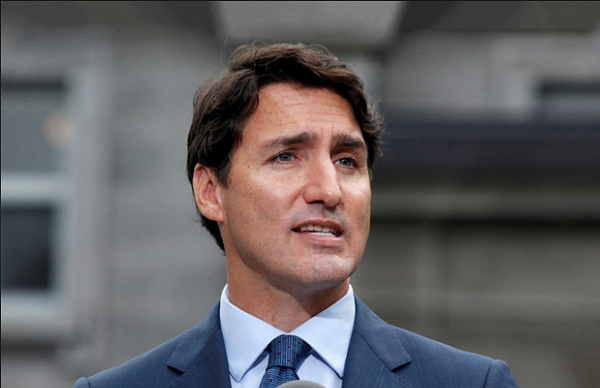Canada’s tech leaders denounce Trudeau’s decision to prorogue Parliament
Canadian technology leaders were once hopeful that the Liberal government of Justin Trudeau would deliver on an ambitious innovation agenda and help unleash Canadian prosperity and productivity.
But by the time he announced his resignation and prorogued Parliament, many had long lost faith in his government’s commitment to their cause and are now actively advocating for change in Ottawa.
“He said all the right things in the early days, but after talking a good game, ultimately, his government will largely go down as a disappointing one for the Canadian tech and innovation sectors,” said Andrew Graham, CEO and co-founder of Toronto-based fintech company Borrowell.
Frustration around Canada’s lagging innovation policy reached a tipping point last year after the government announced changes to capital-gains taxation. Many tech leaders saw the moves, which would increase Ottawa’s take from many of their gains, as punitive to the entrepreneurs trying to build fast-growing enterprises in Canada and help reverse the country’s economic stagnation.
Now, unanswered questions about policies, such as the capital-gains tax and the Scientific Research and Experimental Development (SR&ED) tax-incentive program, have left the industry in a state of uncertainty during Parliament’s prorogation, said John Ruffolo, founder and managing partner of Maverix Private Equity and co-founder of the Council of Canadian Innovators (CCI), which represents domestic tech companies. And to investors or the incoming U.S. administration, uncertainty is not an attractive trait, he added.
“The technology community today has never been so united in their disappointment,” Mr. Ruffolo said.
In recent months, several investors, entrepreneurs and tech executives have taken to social media to denounce the Liberal’s economic policies and often express their support of a new, Conservative-led government. Several leaders of Shopify have voiced their displeasure on X, including CEO and co-founder Tobi Lütke, who took to the social-media platform to decry Mr. Trudeau’s decision to prorogue Parliament, writing, “What isn’t OK: Have millions of Canadians watch from the sidelines for months while the party figures itself out.”
Some are going further, by openly voicing support for Conservative Leader Pierre Poilievre, whose party is far ahead in the polls, even though he has voiced little in the way of innovation policy. Boris Wertz, one of the country’s most successful venture capitalists, said on X this week that he’s excited to work with a new government led by Mr. Poilievre.
Many technology and other business leaders have also attended fundraising events with the Conservative Leader across Canada in the past year.
CCI president Benjamin Bergen said the organization’s members have been watching the Liberal government flounder for years in its attempts to effectively implement innovation policy. For example, he said the government moved so slowly in implementing its new open banking framework that he’s now unsure if the changes, which were meant to launch in early 2026, will ever fully come into effect.
Mr. Bergen is also worried long-awaited changes to the SR&ED program could fall through because of the pause on Parliament. The adjustments to the government’s largest innovation spending initiative were meant to make it more generous, raising the threshold for eligible research and development expenses, and amounting to $26-billion in tax incentives.
“These are things that we’ve been calling for, for the last decade,” he said.
The impact of the Liberals’ sluggish innovation agenda extends beyond Canada’s borders, Mr. Ruffolo said. For investors in the United States, he said the Canadian tech sector is becoming an increasingly unattractive option because of its instability. And the uncertainty around how U.S. president-elect Donald Trump’s proposed tariffs could apply to Canada isn’t helping, he added.
“We’re getting a lot of feedback from U.S. tech leaders basically looking at Canada going ‘What the hell is going on up there?’” Mr. Ruffolo said.
Lisa Melchior, founder and managing partner at VERTU Capital, said time is of the essence for Canada to have a new leader. With many Canadian tech companies exporting to the U.S., she said they need a guiding light in the face of a tariff threat. “Who do we have on our side negotiating that for us?” she said.
To improve productivity and GDP growth, Ms. Melchior said the country’s next leader must prioritize the tech sector.
“Policies that support the industry in a substantive way are going to go a long way to making us all, as Canadians, more successful and wealthier,” she said.
With a federal election on the horizon, Mr. Ruffolo said it’s unsurprising that parties, such as the Conservatives, which are speaking up on issues like taxation reform and the adoption of technology to make the government run more effectively, are gaining traction within the tech sector.
The industry simply isn’t hearing the right rhetoric from the Liberals or the NDP, Mr. Bergen said, which is why it’s increasingly turning to the Conservatives.
“Innovators are having dialogue with them because it’s language and signalling that is at least leading in the right direction,” he said.
This article was first reported by The Globe and Mail













